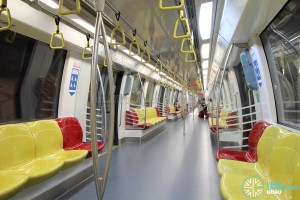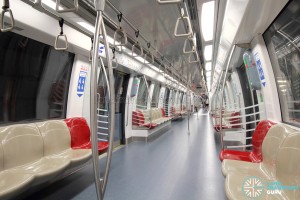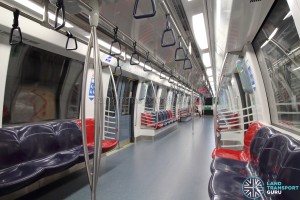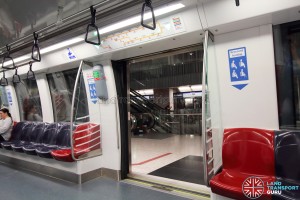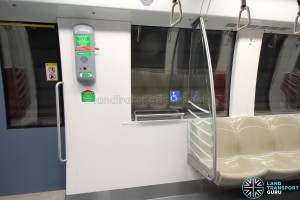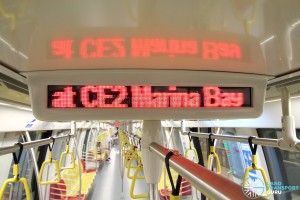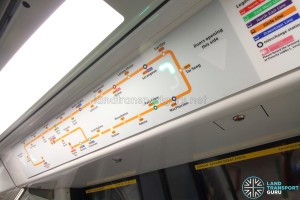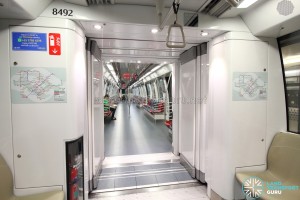| Alstom Metropolis C830C | |
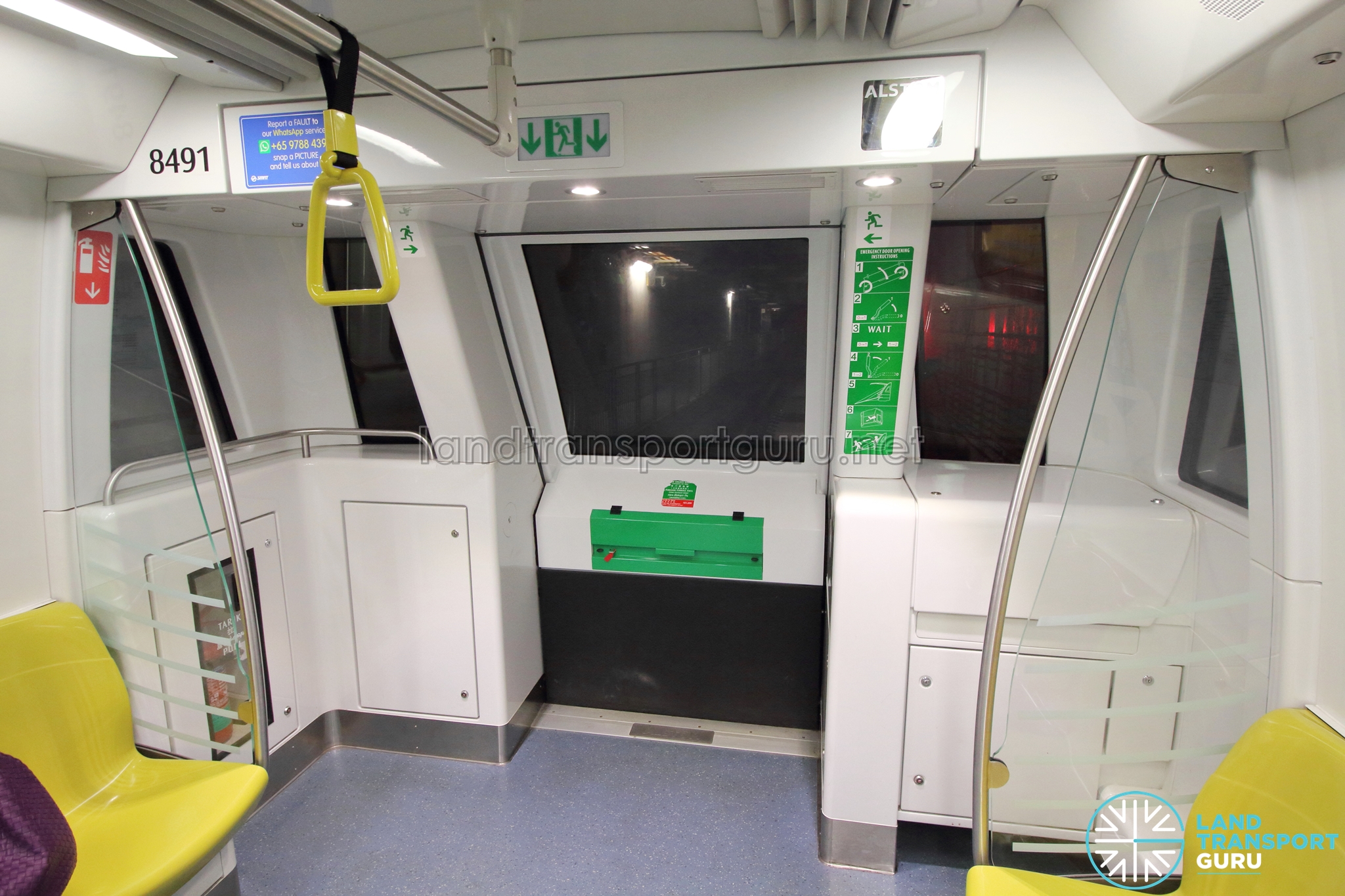 |
|
| In service | June 2015 – Present |
| Manufacturer | Shanghai Alstom Transport |
| Constructed | 2014 – 2015 |
| Number built | 72 Vehicles (24 trainsets) |
| Formation | 3 cars per trainset Mc1–Tc–Mc2 |
| Fleet number | 841 – 864 |
| Operators | SMRT Trains |
| Depot(s) | Kim Chuan |
| Line(s) served | Circle Line |
| Technical Data | |
| Car body | Welded aluminium |
| Doors | 8 per car |
| Electrification | 750 V DC third rail |
| Track gauge | Standard Gauge (1435mm) |
The Alstom Metropolis C830C is an electric multiple unit (EMU) train operating on the Circle Line (CCL). Entering service in June 2015, these were the Circle Line’s second generation of rolling stock. These trains are an effort by LTA to increase the capacity of the Circle Line by 60% during peak hours.
Twenty-four trainsets comprising three cars each were procured. They were manufactured from 2014 to 2015 by Shanghai Alstom Transport Co., Ltd. (a joint venture of Alstom and Shanghai Electric) in Shanghai, China. Deliveries commenced in June 2014.
Background
Contract 830C (C830C) for the procurement of rolling stock called for of 24 trainsets of three cars each, at a value of $134 million. They were built by Shanghai Alstom Transport in Shanghai, China.
The trains were built as part of Alstom’s Metropolis family of urban EMU trains and are similar to the older C830 trains on the Circle Line. They draw power from a 750 V DC bottom-contact third rail, similarly used on the North-South and East-West Lines. Running on Alstom’s Urbalis 300 CBTC system, these trains are fully automated (ATO GoA 4) and do not require an attendant on board.
Each 3-car train comprises two Motor Cars (Mc1 and Mc2) at each end and an unpowered Trailer Car (Tc) in the middle.
History
These trains entered revenue service in June 2015.
Current Design
The exterior of C830C trains is black, with a lower red band running the length of the train. The front of the train was sloped to create a streamlined look. Additionally, a large viewing window above the Emergency Exit Ramp gives more commuters a view of the tunnel.
All C830C trains are comprised of three cars with open gangway connections between all cars. Each car has eight doors, four on each side, with rubber strips at the bottom to reduce the platform-train gap. The interior features longitudinal seating in a different color scheme within each car, namely yellow, khaki and dark blue from front to rear. Priority seats are in red, located in every car near the doors. Trains were also fitted with a Visual Passenger Information System (VPIS), with ceiling-mounted LED textual displays and Dynamic Route Map Displays above every door. Two Wheelchair Bays are located in the middle two cars of every C830C train, at doors 5 and 8.
Emergency Exits are located at both ends of every train, with a ramp that can be deployed in an emergency. Within the cabin, Emergency Communication Buttons (integrated with Door Unlock Handles) are located at the side of the train doors, enabling passengers to speak with staff or open the train doors in an emergency. Fire extinguishers are also placed in every car.
Train Formation
A three-car trainset is formed of two Motor Cars (Mc1 and Mc2) at each end and an unpowered Trailer Car (Tc) in the middle. As such, the running configuration of a C830 trainset is Mc1–Tc–Mc2. 24 trainsets are operated on the line, a total of 72 carriages.
Every car is identified by a four-digit number ranging from 861x to 864x, where the last digit x is carriage identifier. Motor Car 1 uses 1, followed by the middle Trailer Car using 2 and the last Motor Car 2 using 3. Trainsets are identified by their first three digits, i.e. Set 841, Set 842 and on to Set 864.
As such, a sample Set 864 will contain the carriage numbers 8641-8642-8643. Depending on the direction of travel, the sequence may be reversed. All sets were built by Alstom Transport.
Accidents & Incidents
In August and November 2016, intermittent signalling issues caused by unknown signal interference resulted in widespread disruptions to the Circle Line. As trains lost communication with the CBTC network, the emergency brakes were activated as a safety feature, causing trains to stop randomly along the track, and such incidents appeared to happen at random. Eventually, the fault was identified as Trainset 846 (or Passenger Vehicle 46, PV46) whose faulty signalling hardware was emitting erroneous signals that disrupted signals to and from other trains, including those travelling in the opposite direction.
Gallery
External Links & References
- Alstom Metropolis & Shanghai Electric C830C – Wikipedia
- Alstom Metropolis C830C – SGTrains
- Circle Line signalling problems caused by intermittent failure of signalling hardware on train – LTA/SMRT Joint News Release
- How the Circle Line rogue train was caught with data – Data.gov.sg Blog
Back to Trains

